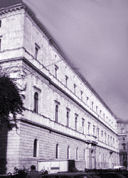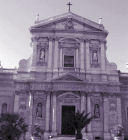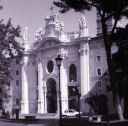Mass and Night Office,
Dom Donald's Blog: Saint Joseph Solemnity Feast in Scotland 19th. Mar...: The carpentry shop in the monastery, Nunraw Abbey' Inscribed picture of St. Joseph's Church in Nazareth. http://www.biblewalks....
++++++++
Wednesday, 19 March 2014
Saint Joseph Solemnity Feast in Scotland 19th. March.
The carpentry shop in the monastery, Nunraw Abbey'
Inscribed picture of St. Joseph's Church in Nazareth.
http://www.biblewalks.com/Sites/StJosephChurch.html
 |
| A painting of Virgin Mary, St. Joseph and the young Jesus in the carpenter's workshop. Early traditions identified the site of the church as the place of the carpenter workshop of the Holy family. |
Mass and Night Office,
St Joseph by Bernard of Clairvaux
SAINT JOSEPH Solemnity 19 March 2010
Night Office - Second Reading
Homily by Saint Bernard (Hom. 2 super Missus est, 11.16: PL 183, 69-70)
v Joseph's character and qualities can be deduced from the fact that God honoured him with the title of father, and, although his doing so was a mere matter of convenience, this was what he was known as and believed to be.Joseph's own name, which as you know means "increase”, supplies further indications. Call to mind the great patriarch of old who was sold into
v His brothers' envy had caused the earlier Joseph to be sold and taken to
The former Joseph kept faith with his master and would not become involved with his master's wife, while his namesake faithfully protected his own spouse, the mother of his Lord, acknowledging her virginity and remaining continent himself. The first Joseph had the gift of interpreting dreams: the second was given a revelation of the divine plan and a share in its accomplishment.
v Joseph the patriarch stored up grain, not for himself but for all the people: our Joseph was given custody of the living bread from heaven to keep safe both for himself and the whole world.
v There is no doubt that the Joseph to whom the Saviour’s mother was engaged was a good and faithful man.
He was, I say, the wise and faithful steward whom the Lord appointed to support his mother and care for himself in childhood, singling him out for his complete reliability to help him with his momentous plan.
v Added to all this, scripture tells us that he was of David's house. Joseph was obviously of David's house, a true descendant of the royal line, a man of noble birth and still nobler disposition. That he was David's son was seen from the fact that he in no way failed to maintain his standard: he was a true son of David not only as regards physical descent, but also in his faith, holiness, and devotion. In him the Lord found, as it were, a second David, a man after his own heart, to whom he could safely confide his most holy and secret design. To him as to another David he revealed the unfathomable, hidden depths of his wisdom, and granted him knowledge of that mystery which was known to none of the princes of this world. In a word, that which many kings and prophets had longed to see and had not seen, to hear and had not heard - that was granted to Joseph. He was all owed not only to see and hear him, but also to carry him, guide his steps, embrace and kiss him, cherish and protect him.
v It is not only Joseph, however, but Mary as well whom we believe to be a descendant of David, for she would not have been engaged to a man of David's line unless she herself had been of that line. Both of them, then, belonged to David's family, but it was in Mary that the oath which the Lord had
v Sworn to David was fulfilled, while Joseph was privy to the promise and witnessed its fulfilment.
|
Magnificat com, with thanks.
MEDITATION OF THE DAY
By FATHER MAURICE ZUNDEL. Father Zundel (+ 1975) was a Swiss mystic, poet, philosopher. liturgist, and author.
Joseph
There is not a word too many or too few. In one movement we are brought to the heart of the Mystery: just so it had suddenly confronted Joseph. But we know what the issue was, and Joseph at that time did not.
He loved Mary. From the first moment of their first meeting he had felt that she was unique and that God was entrusting her to him. Was he now called upon to sacrifice her as Abraham had had to steel himself to the immolation of Isaac?
The wound in his heart was immeasurable. The plain fact was there. No denial, no tenderness could alter it. Her very innocence made his anguish more poignant. Another must be guilty, who should take the responsibility for what he had done.
Joseph could not speak of it to her, since she had chosen to be silent. Any word would have been an outrage. Silence, his silence, shouldgive him back his liberty, for it attested his utter confidence in her.
Thus he came to his decision. And he slept the sleep that relaxes the body but not the soul's pain.
Only if we could concentrate in one heart all the admiration, devotion, fervour that Christian souls were to feel through all generations towards Mary could we form any idea of the love she must have inspired in Joseph, could we divine the immensity of the drama being acted in that hour.
What Dante sang of Beatrice, Joseph could have said in the richest fullness of meaning:
He sees perfectly all salvation
Who sees my Lady among women.
More than any other he felt that human nature was ennobled by her. If he had dared to enter into the espousal, it was to guard the treasure-the treasure which now seemed irremediably lost. ...
Meanwhile Mary watched in prayer, suffering in his suffering, living all the agony that her sealed lips could not abate in him.
The yes that bound her soul to Joseph's was all the more irrevocable in that it engaged her fidelity to God, who was the strong foundation of their union.
Father Zundel (+ 1975) was a Swiss mystic, poet, philosopher. liturgist, and author.













